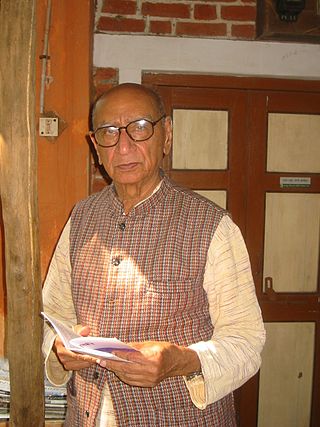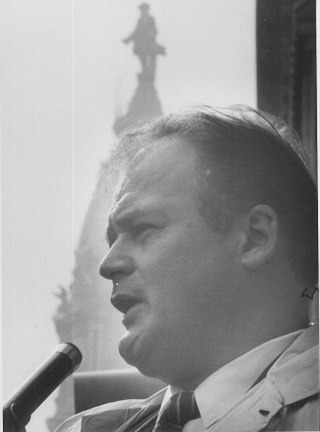
Vinayak Narahari Bhave, also known as Vinoba Bhave, was an Indian advocate of nonviolence and human rights. Often called Acharya, he is best known for the Bhoodan Movement. He is considered as National Teacher of India and the spiritual successor of Mahatma Gandhi. He was an eminent philosopher. The Gita has been translated into the Marathi language by him with the title Geetai.

Nonviolence is the personal practice of not causing harm to others under any condition. It may come from the belief that hurting people, animals and/or the environment is unnecessary to achieve an outcome and it may refer to a general philosophy of abstention from violence. It may be based on moral, religious or spiritual principles, or the reasons for it may be strategic or pragmatic. Failure to distinguish between the two types of nonviolent approaches can lead to distortion in the concept's meaning and effectiveness, which can subsequently result in confusion among the audience. Although both principled and pragmatic nonviolent approaches preach for nonviolence, they may have distinct motives, goals, philosophies, and techniques. However, rather than debating the best practice between the two approaches, both can indicate alternative paths for those who do not want to use violence.
Anarcho-pacifism, also referred to as anarchist pacifism and pacifist anarchism, is an anarchist school of thought that advocates for the use of peaceful, non-violent forms of resistance in the struggle for social change. Anarcho-pacifism rejects the principle of violence which is seen as a form of power and therefore as contradictory to key anarchist ideals such as the rejection of hierarchy and dominance. Many anarcho-pacifists are also Christian anarchists, who reject war and the use of violence.

Gandhism is a body of ideas that describes the inspiration, vision, and the life work of Mohandas K. Gandhi. It is particularly associated with his contributions to the idea of nonviolent resistance, sometimes also called civil resistance.

Ravishankar Vyas, better known as Ravishankar Maharaj, was an Indian independence activist, social worker and Gandhian from Gujarat.

Narayan Desai was an Indian Gandhian and author.
Gandhian economics is a school of economic thought based on the spiritual and socio-economic principles expounded by Indian leader Mahatma Gandhi. It is largely characterised by rejection of the concept of the human being as a rational actor always seeking to maximize material self-interest that underlies classical economic thinking. Where Western economic systems were based on what he called the “multiplication of wants,” Gandhi felt that this was both unsustainable and devastating to the human spirit. His model, by contrast, aimed at the fulfillment of needs – including the need for meaning and community. As a school of economics the resulting model contained elements of protectionism, nationalism, adherence to the principles and objectives of nonviolence and a rejection of class war in favor of socio-economic harmony. Gandhi's economic ideas also aim to promote spiritual development and harmony with a rejection of materialism. The term "Gandhian economics" was coined by J. C. Kumarappa, a close supporter of Gandhi.

Rajagopal P. V. is an Indian Gandhian activist, a former Vice Chairman of the New Delhi Gandhi Peace Foundation, and the president and founding member of Ekta Parishad. In 1972, Rajagopal started working alongside Gandhian activists J.P. Narayan and Subba Rao to disarm 578 bandits in the Chambal region of India. Thereafter, he stayed away from dealing with direct violence and focused on the people of Adivasis, bonded labourers, and other landless communities affected by poverty and exploitation.

Melvin Earl Duncan is the founding Executive Director of Nonviolent Peaceforce (NP), a civilian peacekeeping organization based in Geneva, Switzerland. He holds a bachelor's degree in Political Science from Macalester College in St. Paul, Minnesota and a Master of Arts in Humanities and Leadership from New College of California.
M. Aram (1927–1997) was an educator and peace advocate from India.
Peace Brigades International (PBI) is a non-governmental organization founded in 1981 which "protects human rights and promotes non-violent transformation of conflicts". It primarily does this by sending international volunteers to areas of conflict, who then provide protective, non-violent accompaniment to members of human rights organizations, unions, peasant groups and others that are threatened by political violence. PBI also facilitates other peace-building initiatives within conflict countries. They are a "nonpartisan" organization that does not interfere with the affairs of those they accompany.

Gandhi as a Political Strategist is a book about the political strategies used by Mahatma Gandhi, and their ongoing implications and applicability outside of their original Indian context. Written by Gene Sharp, the book was originally published in the United States in 1979. An Indian edition was published in 1999. The book has been reviewed in several professional journals.
Thakurdas Bang was an Indian Gandhian philosopher and Gandhian economist. He was involved in the Indian independence movement. He practised Gandhism, Gandhian philosophy, Gandhian study even at the age of 95. He was also involved in Khadi and Sarvodaya movements. As an economic professor in G S College of Commerce he motivated many students like Madhukarrao Chaudhari, Justice Chandrashekhar Shankar Dharmadhikari and Ramakrushna Bajaj to participate in the freedom struggle. He is succeeded by Abhay Bang and Ashok Bang. Ashok Bang decided to work for issues related to farming and Abhay decided to work for health of villagers. Abhay and Rani Bang founded SEARCH - a non-profit organization in Gadchiroli, which is involved in rural health service and research

Jugatram Chimanlal Dave (1892–1985) was a Gandhian social activist, freedom fighter and author from Gujarat, India who is remembered for his social work among the tribals of southern Gujarat.
Meta Peace Team (MPT), formerly Michigan Peace Team, is a nonprofit, grassroots organization founded in 1993 that seeks to pursue peace through active nonviolence and create an alternative to militarism through empowered peacemaking. MPT provides creative nonviolence training workshops to ordinary citizens with a framework of third party nonviolent intervention (TPNI), and it deploys peace teams to conflict areas both domestically and internationally. Its peace teams have worked in places such as Iraq, Haiti, Bosnia, Egypt, Panama, Mexico, Gaza Strip, and the West Bank; they have also been placed within the United States to create peaceful presences at national and state political conventions, Ku Klux Klan rallies, and gay pride parades, among many other events. MPT also works in collaboration with other peace and justice groups around the globe, including Nonviolent Peaceforce, Christian Peacemaker Teams, Veterans for Peace, the International Solidarity Movement, Peace Brigades International, the Shanti Sena Network, and the Metta Center for Nonviolence. Its current offices are located in Lansing and Detroit, Michigan. MPT is a founding member of the Shanti Sena Network.

S. P. Varma is a social worker and peace activist from Jammu and Kashmir. He has been actively involved in peace-building efforts in conflict-ridden areas of the Kashmir valley.

Charles Coates Walker was an American Quaker activist and trainer for nonviolent direct action in both the civil rights and peace movements. He worked throughout his life to bring segregation, racial injustice, nuclear and biological weapons, and war to public awareness. He used Gandhian methods of nonviolence, writing training materials and organizing marches, vigils, protest demonstrations, conferences and campaigns in different parts of the world.

Rajnish Kumar is President, All India Prohibition council.
Acharya Ramamurti was an Indian social activist, gandhian, educationist and academic. He headed the review committee of 1990, popularly known as Ramamurti Review Committee, for evaluating the progress of the National Policy on Education of 1986. He was the director of Shrambharati, a non governmental organization, engaged in community development, adhering to Gandhian ideals. The Government of India awarded him the fourth highest civilian award of the Padma Shri in 1999.

Rabindra Nath Upadhyay (1923–2010) was an Indian social worker, Gandhian and the founder of Tamulpur Anchalik Gramdan Sangha (TAGS), a non governmental organization working for the social development of the rural people in the Kumarikata village of Assam. He was a recipient of the 2003 Jamnalal Bajaj Award. The Government of India awarded him the fourth highest civilian award of the Padma Shri, in 2000, for his services to the society.












